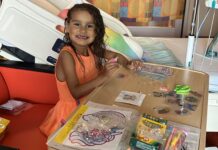
Headlines today are deeply troubling and alarming. After I read about a 6-year-old taking a weapon to class and shooting his teacher, a young man’s death at the hands of those who protect our communities, or the number of shootings in one month in our nation, I am beyond distressed. Are we missing something?
If we are misguided or not guided at all, we will not reach our full potential or mental wellness or well-being. Who makes the rules? Who sets the boundaries? Respecting life and property is a boundary.
From The State Of Mental Health In America, the 2023 key findings are:
From 2019 to 2020, 21% of adults were experiencing a mental illness. That is more than 50 million Americans. More than half (55%) of adults with mental illness do not receive treatment.
More than one in 10 youth in the U.S. are experiencing depression that is severely impairing their ability to function at school, at work, at home, with family or in their social life. Youth ages 12-17 (16%) report suffering from at least one major depressive episode. More than 27 million youth (12%) are experiencing severe major depression. Nationally, 28% of youth with severe depression do not receive consistent treatment. Most, 57%, with severe depression do not receive any care. They do not know what to do.
In the U.S., there are an estimated 350 individuals for every mental-health provider. The number is comparable to the number of individuals per social worker.
Awareness and understanding reduce stigma through education and training. Parents can play an important role in promoting mental health and support to their children by:
Helping children recognize and celebrate their strengths.
Providing a safe place where children and adults can talk about things that concern them.
Teaching and helping children problem-solve and develop plans of action to address difficult situations.
Encouraging children to be active in a variety of school and social events.
Teaching quiet, calm and unwind time during the day.
Teaching how good physical and mental health is important in a balanced life.
Helping children learn skills and empowering them to make good decisions.
Talking about balance and choice with children. Adults can be mindful of the same.
All development is a process throughout life. When we learn to balance physical well-being and mental well-being, we live safe and secure lives.
Erik Erickson developed stages of psycho-social development that lends insight into what children must learn as they mature into adulthood. His interest was in how social interaction and relationships played a role in the development and growth of the individual.
Life has conflicts. When successful in dealing with them, we emerge with strengths and skills that serve us with a strong sense of self. Erickson believed a sense of competence motivates behaviors and actions. A sense of mastery, also referred to as ego strength or quality, provides self-worth, dignity, belonging, problem-solving, self-determination, tolerance and acceptance and respect for others.
We are a series of building blocks. We can always learn and strengthen who we are. The first classroom of our life is at home. If some blocks were missing, we can learn how any time.
It is time to find the space to teach and protect our children the best we can. My condolences go out to the many families that have lost a loved one. We must be diligent.
Harriet Phelps is a retired psychologist and a volunteer at Be Awesome Youth Coalition and Maricopa Senior Center.




![Elena Trails releases home renderings An image of one of 56 elevation renderings submitted to Maricopa's planning department for the Elena Trails subdivison. The developer plans to construct 14 different floor plans, with four elevation styles per plan. [City of Maricopa]](https://www.inmaricopa.com/wp-content/uploads/2024/04/city-041724-elena-trails-rendering-218x150.jpg)

![Affordable apartments planned near ‘Restaurant Row’ A blue square highlights the area of the proposed affordable housing development and "Restaurant Row" sitting south of city hall and the Maricopa Police Department. Preliminary architectural drawings were not yet available. [City of Maricopa]](https://www.inmaricopa.com/wp-content/uploads/2024/04/041724-affordable-housing-project-restaurant-row-218x150.jpg)










![Elena Trails releases home renderings An image of one of 56 elevation renderings submitted to Maricopa's planning department for the Elena Trails subdivison. The developer plans to construct 14 different floor plans, with four elevation styles per plan. [City of Maricopa]](https://www.inmaricopa.com/wp-content/uploads/2024/04/city-041724-elena-trails-rendering-100x70.jpg)